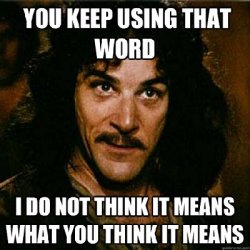jonathan180iq
Well-Known Member
I hope we can agree that disbelief and denial are two different things. Yes?
The former is a response to a lack of evidence ... while the latter is a response despite a preponderance of evidence.
They are two different things, but at some point one cannot exist without the other.
Hell maybe I'm using the word belief to be synonomous with faith, but I really don't consider them to be two separate things. Creationists use ample amounts of both in order to maintain their faith, right?
Either way, I'm trying to speak in generalities so as not to only harp on religious belief. There are all kinds of hokum that people indulge in; God(s) is just one facet of it.Or was it the case that the evidence was eventually revealed to be bogus or nonexistent?
Hold on. The scenario you're describing admittedly contains no actual belief in Santa ... only the pretense of belief!
I agree 100% that people can opt to behave in certain ways. That says nothing whatsoever about the nature of belief. What you're describing is a scenario where people no longer believe in Santa Claus, but opt to pretend that they do.
And that goes hand in hand with then denying the evidence against Santa, and choosing to revert back to what was "known" before, that Santa exists.
I happen to think that your Hypothetical Santa Scenario might be an all-too-painfully-close-to-the-truth summary of religious belief in our era. No real belief at the core ... only the pretense of belief. Habitual devotion. Call it what you will.
One might even go so far as to label it institutionalized deceit.
And it isn't necessarily unique to our era. Skepticism® is only a few seconds younger than Unvarnished BS®.
Glad you caught that.
And I shall maintain that belief is predicated on evidence. In lieu of evidence of the existence of X, the rational response is to not believe in the existence of X.
If we tie evidence into belief then....Yeah, I'm using the word faith where it seems you're using the word belief... Nevermind.
YepI think what you're describing is faith. Faith is typically the last arrow in the quiver after all the other excuses to believe on little or no evidence have been debunked. It has little to do with objective accuracy.

